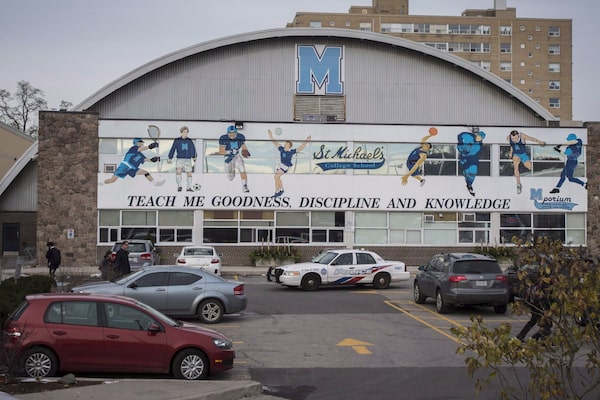
The boys, all 16, were hugged by their tearful parents after the sentence was delivered Thursday afternoon, relieved to have avoided the jail sentence that the prosecution had requested.Tijana Martin/The Canadian Press
Three teens have been sentenced to two years’ probation in a locker room sexual-assault case – one the judge described as a “more extreme criminal extension” of the hazing culture at their all-boys private school.
The boys, all 16, were hugged by their tearful parents after the sentence was delivered Thursday afternoon, relieved to have avoided the jail sentence that the prosecution had requested. A special constable sat by the door of the Toronto courtroom waiting to escort them to provide mandatory DNA samples before their inaugural visits to the probation office.
In his written decision, Ontario Court Justice Brian Weagant described the attacks carried out by these teens as “simulated rape, ostensibly done in the pursuit of fun and excitement, but really perpetrated for the purposes of humiliation and subordination.”
The trio pleaded guilty last month to sexual assault with a weapon (a broom) in one of the attacks, which took place in a locker room at St. Michael’s College School after a football game on Nov. 7, 2018. One of the boys, who filmed the assault on his cellphone, additionally pleaded guilty to making child pornography. The three also pleaded guilty to assault with a weapon in connection with a similar locker room attack a few weeks earlier.
The high-profile case, which came to light last fall after a video of one of the attacks was shared on social media, resulted in the resignation of the school’s principal and president, as well as a review of culture at the all-boys school.
Justice Weagant referred to that review in his judgment Thursday, noting that 21.9 per cent of current students surveyed said they had been bullied at the school. More than half the students said they had witnessed bullying.
“The criminal behaviour in that locker room was fertilized by an atmosphere in which bullying was part of the normative culture,” Justice Weagant wrote. “The incidents in this case were a further and more extreme criminal extension of what was already going on in their school lives.”
A total of seven students were initially charged in this case, though two of them had their charges withdrawn this year. Another boy entered a separate guilty plea this summer and was also sentenced to two years’ probation, although it is unclear what specifically he pleaded guilty to.
Just one accused remains before the courts. He is scheduled to go to trial in the new year.
The family of one of the victims filed a civil lawsuit against three of the perpetrators, as well as the school and its board, founders, former principal and president, athletic director and coaches of the football team.
A spokesperson for the school said it was notified about the sentencing Thursday but declined to comment, other than to say that it continues “to pray for all the individuals involved.”
In his written ruling Thursday, Justice Weagant emphasized the remorse shown by the three teens not only for what they had done, but also for what they had not done.
“Each realizes that he had a chance to stop what was happening but did not,” he wrote. “This insight alone, coupled with the very positive risk assessment, convinces me that there is no need for specific deterrence in this case.”
He argued that, in this case, denunciation is achievable through means other than a custodial sentence.
“The boys are all keenly aware of the stress and shame brought on their families,” he wrote, noting the intense media coverage the case has received. “I think it is safe to conclude that these young persons have heard society’s voice loud and clear.”
In addition to the DNA order, the teens were ordered to attend counselling or treatment as directed by their probation officers. They are also not to have any contact with each other, their victims or other members of their former football team. An exception was made for football leagues, where the lawyers agreed they could inadvertently find themselves on opposing teams.
Justice Weagant wrote in his ruling that he believes all three of these teens will continue on in sports – and will likely encounter hazing again.
“I say this directly to the three young persons,” he wrote. “When you encounter bullying or hazing again, I take you at your word that you will call it out. … Your message has to be: It is always wrong for older, stronger or more senior males to sexually humiliate, bully, or assault their more vulnerable colleagues, particularly when the behaviour masquerades under the guise of acceptable male sports culture.”
 Molly Hayes
Molly Hayes